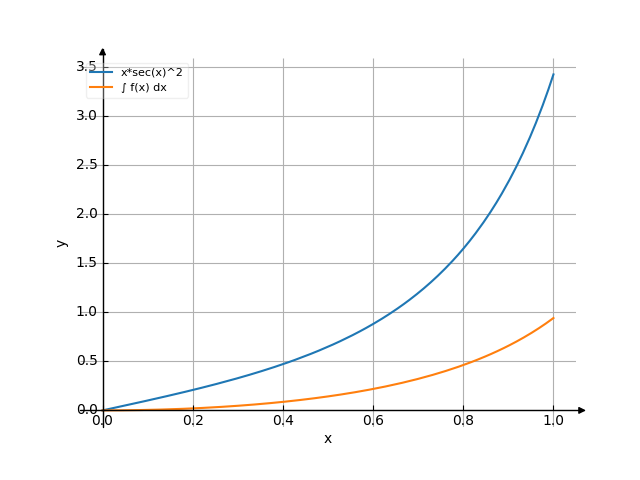Integral of x*sec^2(x) dx
The solution
You have entered
[src]
1 / | | 2 | x*sec (x) dx | / 0
$$\int\limits_{0}^{1} x \sec^{2}{\left(x \right)}\, dx$$
Integral(x*sec(x)^2, (x, 0, 1))
Detail solution
-
Use integration by parts:
Let and let .
Then .
To find :
Now evaluate the sub-integral.
-
Rewrite the integrand:
-
Let .
Then let and substitute :
-
The integral of a constant times a function is the constant times the integral of the function:
-
The integral of is .
So, the result is:
-
Now substitute back in:
-
-
Add the constant of integration:
The answer is:
The answer (Indefinite)
[src]
/ | | 2 | x*sec (x) dx = C + x*tan(x) + log(cos(x)) | /
$${{\left(\sin ^2\left(2\,x\right)+\cos ^2\left(2\,x\right)+2\,\cos
\left(2\,x\right)+1\right)\,\log \left(\sin ^2\left(2\,x\right)+
\cos ^2\left(2\,x\right)+2\,\cos \left(2\,x\right)+1\right)+4\,x\,
\sin \left(2\,x\right)}\over{2\,\sin ^2\left(2\,x\right)+2\,\cos ^2
\left(2\,x\right)+4\,\cos \left(2\,x\right)+2}}$$
The graph
The answer
[src]
log(cos(1)) + tan(1)
$${{\left(\sin ^22+\cos ^22+2\,\cos 2+1\right)\,\log \left(\sin ^22+
\cos ^22+2\,\cos 2+1\right)+4\,\sin 2}\over{2\,\sin ^22+2\,\cos ^22+
4\,\cos 2+2}}-{{\log 4}\over{2}}$$
=
=
log(cos(1)) + tan(1)
$$\log{\left(\cos{\left(1 \right)} \right)} + \tan{\left(1 \right)}$$
The graph

Use the examples entering the upper and lower limits of integration.

![Find the integral of y = f(x) = x*sec²(x) dx (x multiply by sec squared (x)) - with detailed solution [THERE'S THE ANSWER!] x*sec^2(x)](/media/krcore-image-pods/176/hash/indefinite/b/85/cfa4a65bfe0d9ba2bfe3df48e5457.png)
 Integral of sqrt(x^2-1)/x
Integral of sqrt(x^2-1)/x
 Integral of -xsinx
Integral of -xsinx
 Integral of xarctg(x)
Integral of xarctg(x)
 Integral of x*sec^2(x)
Integral of x*sec^2(x)